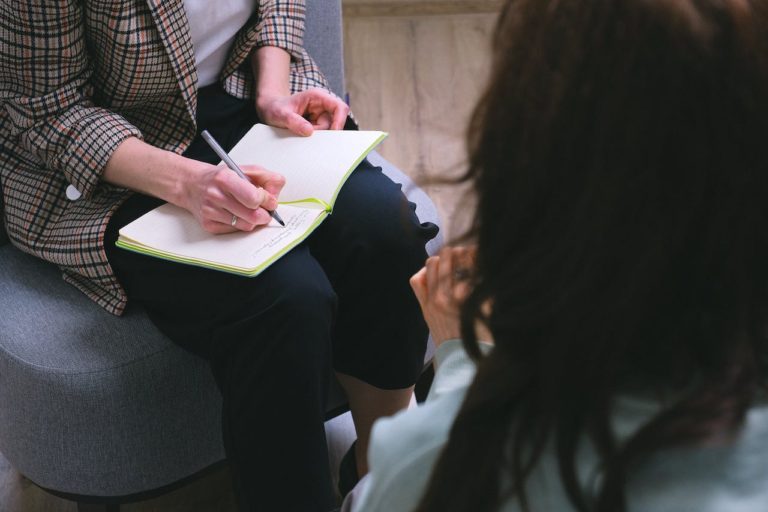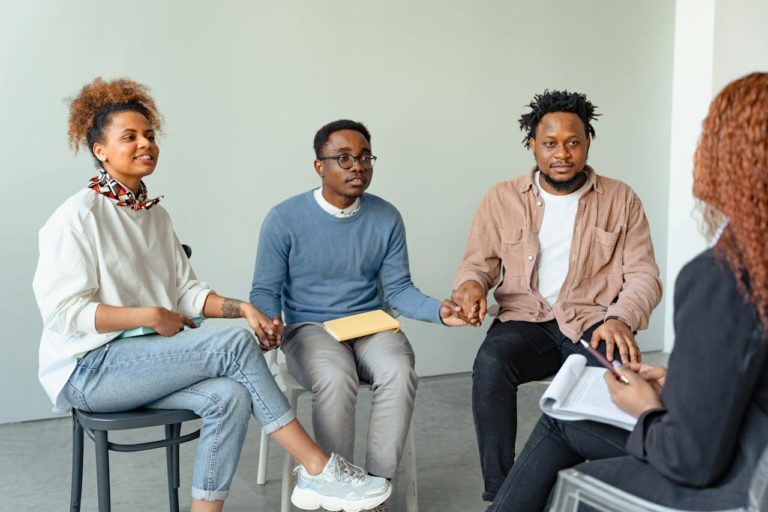Counselling Services
Choose the service that best suites your needs and comfort.
Have a Look at Tammie k. Ross's
Counselling Services
Tammie prioritizes your well-being. Please choose the best service that suits your needs.
01.
Individual Counselling or Psychotheraphy
Individual therapy, also known as counselling or psychotherapy, offers a range of benefits for individuals seeking support and personal growth.

- Personalized Attention: Individual therapy provides one-on-one attention between the client and the therapist. This allows for a personalized approach tailored to the specific needs, goals, and challenges of the individual.
- Confidentiality: Sessions are private, creating a safe and confidential space for individuals to express their thoughts, feelings, and concerns without fear of judgment. This confidentiality fosters trust and openness between the client and therapist.
- Focused Exploration: The therapist can concentrate on the unique issues and experiences of the individual. This focused exploration enables a deeper understanding of underlying issues and the development of more targeted interventions.
- Goal Setting: Individual therapy allows for the identification and exploration of personal goals. Therapists work collaboratively with clients to establish realistic and achievable objectives, providing guidance and support as individuals work toward their desired outcomes.
- Increased Self-Awareness: Through introspective discussions and self-reflection, individuals can gain a better understanding of themselves, including their thoughts, emotions, behaviors, and patterns of relating to others. This increased self-awareness can lead to personal growth and positive changes.
- Emotional Regulation: Therapy provides a safe space to explore and understand emotions. Therapists can teach individuals effective strategies for managing and regulating their emotions, promoting emotional well-being and resilience.
- Coping Skills: Therapists can help individuals develop and strengthen coping skills to manage stress, anxiety, and other challenges. Learning healthy coping mechanisms enhances an individual’s ability to navigate life’s difficulties.
- Behavioral Change: For individuals looking to change specific behaviors or patterns in their lives, therapy offers a supportive environment to explore alternatives, set goals, and work toward sustainable change.
- Problem-Solving: Therapists assist individuals in developing problem-solving skills, enabling them to approach challenges in a more constructive and effective manner. This skill set can be valuable in various aspects of life, both personally and professionally.
- Improved Relationships: Understanding oneself better often leads to improved interpersonal relationships. Therapy can help individuals identify and address patterns that may contribute to difficulties in relationships and develop healthier ways of relating to others.
- Enhanced Self-Esteem: Individual therapy can contribute to the development of a more positive self-image and increased self-esteem. As individuals gain insight into their strengths and challenges, they can work toward building a more confident and resilient sense of self.
- Long-Term Benefits: The skills and insights gained in individual therapy can have lasting effects, providing individuals with tools to navigate future challenges and maintain overall well-being
02.
Couples Counselling
Couples counselling is a form of psychotherapy that aims to help couples improve their relationships and resolve conflicts.

- Improved Communication Skills: Couples counselling provides a safe and structured environment for couples to communicate openly and honestly. Therapists can help couples learn effective communication skills, such as active listening and expressing thoughts and feelings in a constructive manner.
- Conflict Resolution: Couples often face conflicts and disagreements. Counselling helps couples develop effective strategies for resolving conflicts in a healthy and productive way. This can prevent recurring issues and strengthen the relationship.
- Enhanced Understanding: Therapists assist couples in gaining a deeper understanding of each other’s perspectives, feelings, and needs. This increased understanding can foster empathy and empathy, leading to a stronger emotional connection.
- Identifying Patterns: Couples counselling helps individuals and couples identify negative patterns of behavior or communication that may contribute to relationship problems. Once recognized, couples can work on breaking these patterns and establishing healthier dynamics.
- Addressing Individual Issues: Sometimes, individual issues or unresolved personal problems (triggers) can impact a relationship. Couples counselling provides a platform for individuals to address their personal concerns, and therapists can guide the couple in finding solutions that benefit both partners.
- Rebuilding Trust: Trust is crucial in any relationship. If trust has been eroded due to past experiences such as infidelity, couples counselling can help rebuild it. Therapists can assist in identifying the underlying issues and developing strategies to rebuild trust over time.
- Increased Intimacy: Couples counselling can enhance emotional and physical intimacy. By addressing underlying issues and improving communication, couples may experience a deeper connection and increased emotional and physical closeness.
- Preventing Future Issues: Couples counselling is not just about addressing current problems; it also equips couples with tools and skills to navigate future challenges effectively. This proactive approach can help prevent the escalation of minor issues into major conflicts.
- Support During Transitions: Life transitions, such as marriage, parenthood, career changes, or relocation, can pose challenges to a relationship. Couples counselling provides support and guidance during these transitions, helping couples adapt to changes and grow together.
- Enhanced Relationship Satisfaction: Ultimately, couples counselling aims to improve overall relationship satisfaction. By addressing issues, building stronger communication skills, and fostering understanding, couples can experience a more fulfilling and satisfying relationship.
What is the Gottman Couples Therapy Method?
The Gottman Method Couples Therapy is an approach to couples therapy that was developed by Drs. John and Julie Gottman. It is based on their extensive research on couples and relationships, spanning several decades. The Gottmans have observed and studied thousands of couples to identify patterns of behaviour that are indicative of relationship success or distress.
the effectiveness of couples counselling can vary depending on the specific circumstances and the willingness of both partners to actively engage in the process. Homework is an important part of this process and encouraged.
- The Sound Relationship House: The Gottmans conceptualize a healthy relationship as a “Sound Relationship House” with different levels or floors representing various aspects of the relationship. These levels include building love maps, sharing fondness and admiration, turning toward each other instead of away, the positive perspective, managing conflict, making life dreams come true, creating shared meaning, and trust.
- The Four Horsemen of the Apocalypse: The Gottmans identified four negative communication patterns that, when present in a relationship, can be predictive of divorce. These are criticism, contempt, defensiveness, and stonewalling. The therapy focuses on helping couples recognize and replace these destructive communication styles with more positive and constructive ones.
- Bids for Connection: The Gottmans emphasize the importance of bids for connection, which are small gestures, expressions, or attempts to connect with a partner. Responding positively to bids for connection strengthens the emotional bond between partners.
- Repair Attempts: Inevitably, conflicts arise in relationships. The key is not to avoid conflicts but to navigate them in a healthy way. The Gottman Method encourages the use of repair attempts—efforts to de-escalate tension and reconnect during a conflict.
- Love Maps: Knowing your partner deeply is a fundamental aspect of a strong relationship. Love maps involve understanding your partner’s inner world, including their likes, dislikes, fears, and dreams. The therapy helps couples build and update their love maps.
- Emotional Bank Account: The concept of the emotional bank account involves making regular deposits of positive interactions and expressions of love and appreciation to build a reserve for times of conflict or stress.
- Flooding and Physiological Arousal: The therapy recognizes the impact of physiological arousal on communication. Flooding refers to a state of emotional overwhelm where it becomes difficult to have a productive conversation. Techniques for self-soothing and calming down are taught to help couples manage conflict more effectively.
Gottman Method Couples Therapy is practical and goal-oriented, often involving specific exercises and interventions for couples to practice outside of therapy sessions. The ultimate goal is to help couples strengthen their friendship, manage conflict constructively, and create shared meaning in their relationship. The method is widely used by therapists and counsellors around the world to support couples in building and maintaining healthy, lasting relationships.
To know more about the Gottman Method, check this link: https://www.gottman.com/about/the-gottman-method/
03.
Group Counselling
Group counseling is a form of therapeutic intervention where our Gottman-trained therapist works with a small group of couples who share common concerns or issues. These groups typically consist of 6 to 12 participants (or 3 to 6 couples) who meet regularly to discuss their experiences, thoughts, and feelings in a supportive and confidential environment.

- Interpersonal Relationships: Groups provide an opportunity for individuals/couples to explore and improve their relationship skills by interacting with others in a safe and controlled setting.
- Personal Growth: Our group counselling allows members to share their personal experiences, challenges, and successes. This sharing can lead to personal insights, self-awareness, and positive changes.
- Social Support: Participants often find comfort and support in realizing that they are not alone in their struggles. The group dynamic fosters a sense of community and understanding.
- Feedback and Perspective: Participants can gain valuable feedback and different perspectives on their issues from both the counsellor and fellow group members. This can help individuals/couples see their challenges from different angles.
- Normalization: Group counselling can help normalize experiences by illustrating that others face similar challenges. This can reduce feelings of isolation and shame.
- Skill Building: Group sessions often incorporate skill-building exercises and activities that help participants/couples develop coping strategies, communication skills, and other tools for personal growth.
- Cost-Effective: Group counselling is often more cost-effective than individual/couples therapy, making mental health support more accessible to a broader range of people.
- Empathy and Compassion: Being part of a group allows individuals/couples to witness and practice empathy and compassion, fostering a sense of connection and understanding.
- Reduced Stigma: The group setting can help reduce the stigma associated with seeking mental health support. Sharing experiences in a group can contribute to a more open and accepting attitude towards mental health challenges.
- Diversity of Perspectives: Group members come from diverse backgrounds, which can contribute to a rich array of perspectives. This diversity can be particularly helpful in challenging assumptions and broadening one’s understanding.
04.
Retreats
Our couples retreats can be highly beneficial for relationships as they provide a dedicated and focused environment for couples to strengthen their bond, address issues, and improve communication.

- Quality Time Together: Our couples retreats offer an opportunity for couples to spend quality time together away from the distractions and responsibilities of daily life. This time away allows them to reconnect and deepen their emotional intimacy.
- Improved Communication: Our retreats incorporate communication exercises and workshops aimed at enhancing the way couples interact. These activities can provide practical tools and strategies for effective communication, helping couples express their feelings and needs more openly and constructively.
- Conflict Resolution: Our retreats often include sessions on conflict resolution and problem-solving. Couples can learn healthy ways to navigate disagreements, understand each other’s perspectives, and find resolutions that strengthen their relationship rather than causing further strain.
- Relationship Assessment: Our retreats provide an opportunity for couples to assess the current state of their relationship. Professional facilitators or therapists may guide couples in identifying areas that need improvement and developing strategies for positive change.
- Renewed Intimacy: By stepping away from the routine of daily life, couples can rediscover and rekindle their physical and emotional intimacy. Our retreats will include activities and exercises designed to reignite passion and connection.
- Learning New Skills: Our couples retreats often include workshops on relationship skills, such as active listening, empathy, and compromise. These skills can be valuable for sustaining a healthy and fulfilling relationship over the long term.
- Stress Reduction: Taking a break from the stressors of everyday life can help couples relax and unwind. Reduced stress levels can positively impact a relationship, making it easier for couples to connect and enjoy each other’s company.
- Shared Experiences: Engaging in activities together during a retreat creates shared experiences that can strengthen the emotional bond between partners. Whether it’s participating in couple-building exercises, outdoor adventures, or relaxation activities, these shared moments can create lasting memories.
- Professional Guidance: Our couples retreats are facilitated by a Gottman-trained therapist who can offer professional guidance. Having an objective third party can provide valuable insights and support for couples working through challenges.
- Investment in the Relationship: Choosing to attend our couples retreat demonstrates a commitment to investing time and effort into the relationship. This shared commitment can create a sense of unity and motivation to continue working on the relationship after the retreat ends.
Would you like to know more...
Book a Consult
Let me help you in achieving a more fulfilling life and healthier relationships.
Send a message to me here TODAY!
Our location
306-717 Richmond St., London, ON N6A 1S2
CONTACT
Cell: (519) 870-7176 Email: tammie@ihsolutions.ca
